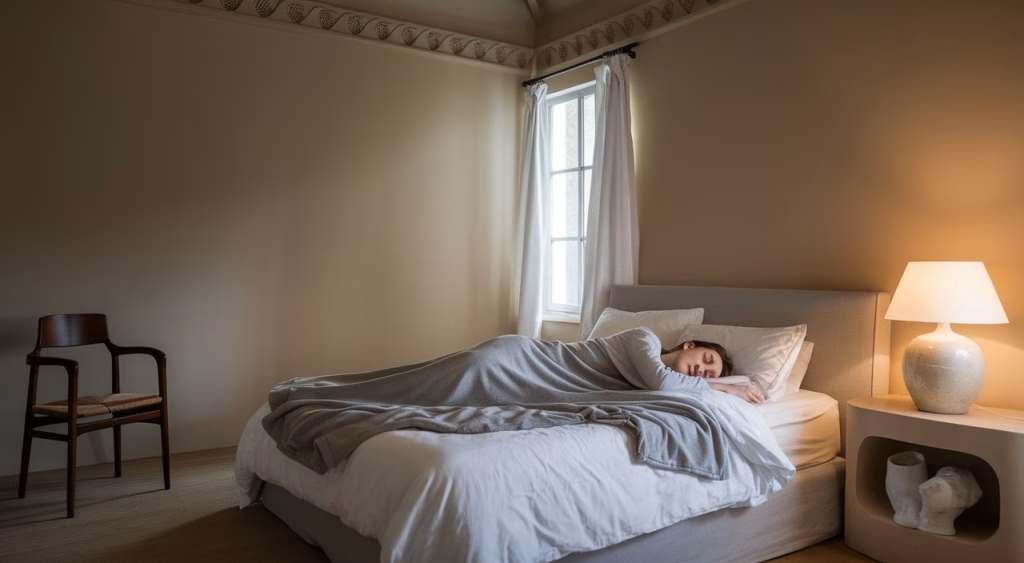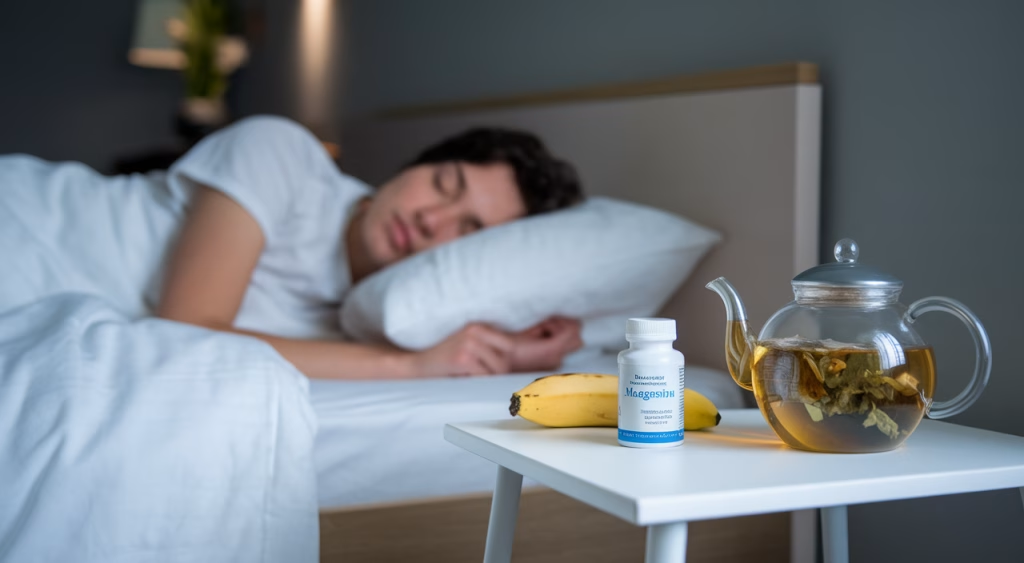Can simple exercises really help reduce sleep apnea and stop snoring?
Yes — targeted, daily sleep apnea exercises, especially tongue exercises for snoring, can significantly reduce snoring and mild obstructive sleep apnea symptoms. These natural snoring remedies strengthen your upper airway muscles and improve airflow during sleep.
TL;DR: Summary
- Sleep apnea exercises can help reduce snoring by strengthening airway muscles.
- Easy daily tongue exercises for snoring like the Tongue Press and Slide show promising results.
- Natural snoring remedies include nasal strips, sleeping position strategies, and cleaner sleep hygiene.
- Lifestyle changes for sleep apnea like weight loss, fitness, and improved sleep habits boost effectiveness.
- If you have moderate or severe sleep apnea, consult a specialist for a customized plan.
Understanding Sleep Apnea
What Causes Snoring and Sleep Apnea
Snoring often begins as a gentle rumble but can quickly evolve into loud, persistent nighttime noise — disturbing both your sleep and your partner’s. But what causes it? Simply put, snoring happens when your airway is partially blocked during sleep. The airflow causes the surrounding tissues to vibrate — that’s the snoring sound you hear.
With obstructive sleep apnea (OSA), that blockage becomes more serious. Your airway may temporarily collapse, causing you to briefly stop breathing multiple times a night. This leaves you tired, irritable, and susceptible to long-term health issues like high blood pressure, heart disease, and even depression.
Key contributors to snoring and sleep apnea include:
- Weak muscles in the throat and tongue
- Obesity or fat deposits around the neck
- Sleeping on your back
- Nasal congestion or blockage
- Alcohol or sedative use before bed
Understanding the root cause of your snoring lays the foundation for effective, natural intervention like sleep apnea exercises.
The Link Between Tongue Exercises and Reduction of Snoring
Think of your tongue like a lazy river — if it’s too relaxed at night, it drifts backward and blocks your airway. But when you tone and strengthen it with tongue exercises for snoring, it stays in place, allowing you to breathe clearly.
Emerging research shows that practicing certain tongue and throat exercises, also known as oropharyngeal exercises, can significantly reduce the frequency and severity of snoring. These sleep apnea exercises improve muscle tone in the upper airway — essentially tightening the slack that causes vibration.
One popular study showed participants reduced their snoring frequency by 36% through consistent daily exercises. Better yet? No machines, no medications — just your body supporting your sleep naturally.
Effective Tongue Exercises for Sleep Apnea
Exercise 1: Tongue Press
The Tongue Press is a simple yet powerful tool to tone your tongue and open your airway — one of the most effective tongue exercises for snoring relief.
How to do it:
- Press the entire tongue against the roof of your mouth.
- Hold it in place for 5 seconds.
- Release and repeat 10 times, twice per day.
In practice, you’ll start to feel your tongue muscle engage — maybe slightly sore at first, indicating it’s working. Over weeks, this daily sleep apnea exercise helps keep your tongue forward, reducing its tendency to fall back while sleeping.
Exercise 2: Tongue Slide
This second exercise stretches and strengthens the full length of the tongue — ideal for combatting airway obstruction and a cornerstone of natural snoring remedies.
How to do it:
- Place the tip of your tongue on the back of your top front teeth.
- Slide the tongue backward across the roof of your mouth as far as it goes.
- Repeat 10 times, twice daily.
Stick with it: within 4–6 weeks, most people report noticeable improvements in their snoring intensity and sleep quality when combining these tongue exercises for snoring with other lifestyle changes.
Lifestyle Changes to Support Sleep Apnea Treatment
Diet and Exercise
Ever noticed how snoring tends to worsen when you gain a few pounds? Fat doesn’t just settle around your waist — it can build up around your neck and throat, narrowing your airway and worsening both snoring and sleep apnea.
That’s why sustainable weight loss is one of the most effective lifestyle changes for sleep apnea. Try these evidence-based strategies:
- Balanced diet: Add fiber, lean proteins, and cut refined sugars. Avoid heavy meals before bed.
- Daily movement: Even 30 minutes of walking reduces inflammation and promotes circulation.
- Avoid alcohol: Especially within 3 hours of bedtime — alcohol relaxes throat muscles.
Sleep Hygiene Tips
Good sleep hygiene won’t just improve your rest — it supports the effectiveness of your sleep apnea exercises and other natural snoring remedies.
Here’s what we recommend for optimal results:
- Maintain a consistent bedtime, even on weekends.
- Keep bedroom temperatures cool and dark.
- Limit screen time before bed to reduce blue light exposure.
- Elevate your head with pillows to encourage clear airflow.
Beyond Exercises: Other Natural Remedies for Snoring
Nasal Strips and Sprays
Sometimes the problem isn’t in your throat — it’s in your nose. Congestion from allergies or sinus issues causes mouth-breathing and snoring, making these natural snoring remedies essential for complete relief.
Natural remedies that may help include:
- Saline nasal sprays to reduce dryness and swelling
- Nasal strips for keeping nasal passages open
- Inhaling steam before bed to open congested airways
Positional Therapy
Did you know you’re more likely to snore when sleeping on your back? In this position, gravity causes your tongue and soft palate to collapse backward, blocking airflow — even when you’re doing tongue exercises for snoring regularly.
Positional therapy helps retrain your body to sleep on your side, reducing airway obstruction naturally and complementing your sleep apnea exercises.
- Use firm body pillows to stay in place
- Try strategic pillow placement to elevate head and shoulders
- Practice side-sleeping during naps for habit training
Cost Guide: Comparing Snoring Relief Strategies
| Remedy | Cost Range | Notes |
|---|---|---|
| Sleep Apnea Exercises | Free | Requires consistency, no tools needed |
| Nasal Strips/Sprays | $5–$20 monthly | Relief for nasal-related snoring |
| Positional Pillows | $25–$100 one-time | Useful for back-sleepers |
| Specialist Consultation | $150–$500+ | Essential for moderate/severe apnea |
Final Thoughts
Snoring doesn’t just rob you of restful sleep — it strips away quality of life for both you and those closest to you. The good news is, you’re not helpless. Through simple, well-practiced sleep apnea exercises and tongue exercises for snoring, you can literally tone your way to quieter nights. Combine these efforts with smart lifestyle changes for sleep apnea and natural snoring remedies to build a holistic, personalized plan for better sleep — all without medicine or machines.
Now that you’ve read this guide, pick one or two exercises and start today. Your future self — well-rested and snore-free — will thank you for taking action.
Frequently Asked Questions
How do you exercise your tongue to stop snoring?
By practicing targeted tongue exercises for snoring like tongue presses and slides twice daily. These sleep apnea exercises strengthen the muscles around your airway, reducing blockage and vibration.
How long does it take to see results from snoring exercises?
Most people see improvement in 4–6 weeks when sleep apnea exercises are done consistently. Some notice changes in as little as two weeks with dedicated practice.
Can snoring be cured without surgery or devices?
Yes — many people achieve relief through sleep apnea exercises, natural snoring remedies, weight loss, improved sleep habits, and nasal support tools.
Are these exercises safe for older adults?
Absolutely. As non-invasive, natural snoring remedies, tongue exercises for snoring are considered safe for all ages and fitness levels.
What if exercises don’t help my snoring?
If symptoms persist despite consistent sleep apnea exercises and lifestyle changes for sleep apnea, you may have moderate or severe sleep apnea. A sleep study and consultation with a specialist is the next best step.
Do tongue exercises help with sleep apnea long-term?
Yes. When tongue exercises for snoring are done daily and combined with lifestyle improvements, they can reduce the severity or frequency of apnea episodes over time.
Should I stop using my CPAP if exercises help?
Never stop using medical devices without professional advice. If you’re experiencing improvement from sleep apnea exercises, talk to your sleep specialist about adjusting treatment.





